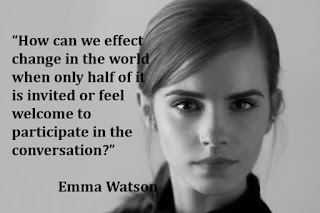Re-distributed Love
Arlie Hochschild’s, “Love and Gold”,
and Ann Crittenden’s, “Mommy Tax”, have been very different from the readings
so far. What I enjoyed about Hochschild’s and Crittenden’s articles were that
they both had a lot of facts and information in them. I think that knowing facts
like these will help build my argument when dealing with sexist situations and
thinking about feminine perspective as a whole. It is important to me to be
able to back my opinions with factual information as provided in these two
readings.
Although I cannot say that I have
experienced the love of a nanny from a Third World country, I have experienced
the love of many nannies during my childhood. Because my mom passed away when I
was younger, and my dad worked a full-time job, my brother and I had many
babysitters and nannies. I feel like there is often a stigma surrounding
families who decide to have nannies for their children. By no means does the
fact that I had nannies mean that my dad neglected and didn’t spend time with
me. In fact, my dad has been to every single sporting event I have ever
participated in. But the love I have for my dad is very different from the love
I have for my old nanny and now best friend, Maggie. I can relate Hochschild’s claim
that the way nannies love is different from the way children’s’ parents love
because they don’t suffer through the same “anxieties about their children’s
success” as parents do. In fact, Hochschild argues that migrants from third
world countries “know how to love a child better than the middle-class white
parents”. While I don’t disagree with this statement, I would say that it is
not that migrants know “how to love better”, but rather they love in a
different, more patient way.
While these migrants from third
world countries love the children they take care for, it is often because of
the loneliness they feel from having to leave their own children. This void,
however, is not only experienced by the parent, but also the children. While I can’t
imagine how hard it would be as a migrant parent to have to leave your child
for an unknown period of time, I speculate that it might be even harder for the
children of these migrant parents. Hochschild claims that often times, these
children “show a rise in delinquency and child suicide”. This horrifying and eye-opening
fact reminds me of how fortunate I am to have a parent that is always around and
gives me unconditional love and attention. I cannot begin to comprehend how
hard this emotional deprivation must be for these children whose parents
migrate across the world. This migration to America is in response to the
widening gap between the rich and the poor. I was shocked when Hochschild exclaimed
that “the middle class of the Third World now earns less than the poor of the
First World”. In America, I feel that we don’t realize the scope to which
immigrant women suffer due to globalization. This discrepancy between what
women are paid in different countries are similar to the discrepancy between
what women and men are paid. Hochschild claims that, “72% of all American women
now work” and while the equal pay act was passed in 1963, women are still paid
less than men. In fact, Ann Crittenden exclaims in her article, “The Mommy Tax”,
that “the average earnings of all
female workers in 1999 were 59 percent of men’s earnings”. This is 36 years
after the EPA passed and women still are not recognized as equals in the work
place!
Although it is hard for women in general
to support themselves, it is even harder for mothers to support themselves and
their children because of the “Mommy Tax”. Crittenden states from her own
experience, that she lost between “$600,000 and $700,000” because she decided
to raise a child. She then further expresses that women, especially of lower
income status, sometimes decide not to have children because they cannot afford
it. This is crazy! In this day in age, women are restricted on whether or not
they can have a child based on economic status. It is terrifying to think that
money has this much power over determining whether or not a woman will decide
to have a child. There is literally a cost to being a mother. However, this is
not true in all countries. For example, France gives “Free health care and a
cash allowance for each child” (Crittenden). This being said, Crittenden argues
that mothers from all countries are undervalued and underappreciated. In fact,
their roles as mothers are often undermined and they face not only a lack of financial
support, but also social.
-Jane B
-Jane B



Jane-
ReplyDeleteI love your commentary on this different kinds of love and the different ways to express it. It is so poignant against the reality of where that love comes from for an immigrant woman. I also really appreciate your candidness in lieu of the earning discrepancies worldwide. "This is crazy!"...I know right...ily